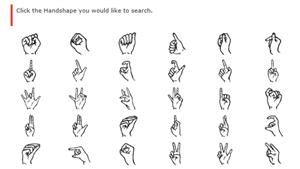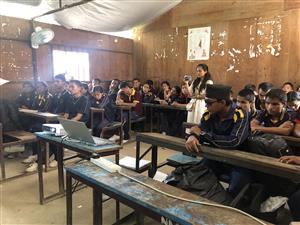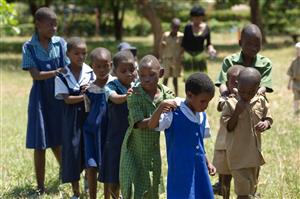Search Results
Search
Filter results
Advanced Filters
Your search returned 883 Solutions
-
The Leveraged Freedom Chair is designed to enable wheelchair users in developing countries to travel effectively on unpaved surfaces and therefore access and integrate with their community.
The LFC is built out of steel and bicycle parts that can be found in any rural village in any developing country. This enables repair anywhere. A mass production manufacturing centre for the LFC was established in 2012. Located in India, the centre is in close proximity to developing countries across Asia and Africa.
GRIT Freedom Chair, Mountainbike-wheelchair' for rough terrain, United States of America -
Inclusive design agency promoting access to arts and culture
By combining digital and multisensory elements, Tactile Studio, a design agency from France, designs accessible experiences for museums and other cultural institutions aimed at people with visual impairments, combining digital and multisensory elements.
Tactile Studio France, Inclusive & multi-sensory pathways, France -
ANTI-DISCRIMINATION AND ACCESSIBLITY ACT & EQUALITY AND ANTI-DISCRIMINATION OMBUD AND TRIBUNAL
Norway’s Anti-Discrimination and Accessibility Act of 2008 is the country’s first nationwide non-discrimination act. It introduced legal safeguards against discrimination of people with disabilities in all sectors of society. The focus is on buildings, transport and ICT. The law also includes an obligation to use universal design.
Norwegian Ministry of Children, Equality and Social Inclusion, Universal design in non-discrimination law, Norway -
The EBU job website tells visually impaired people, employers and policy makers across Europe about the huge range of jobs undertaken by visually impaired people. It is part of a range of work carried out by EBU to examine, promote, and facilitate the employment of blind and partially sighted people.
EBU - European Blind Union, An employment resource for the visually impaired, France -

Archive and search engine for Asian sign languages
The Asian SignBank is the first archive for sign language varieties in Asia and has been implemented to facilitate sign language teaching, development, and research. For each participating country signs are collected, filmed, analyzed, documented, and archived. By 2017 the online database contained of over 6,000 signs.
Centre for Sign Linguistics and Deaf Studies, China - Hong Kong -
Making the cinema accessible for all throughout Colombia
By reducing regulatory hurdles and providing financial incentives, the initiative wants to encourage cinema owners to make their facilities more accessible. The Ministry also developed an app offering audio descriptions, sign language, and subtitles corresponding to the audio-visual content of "Cine para todos".
Colombian Ministry of Information and Communication Technology, Colombia – Ministry of Information and Communications Technology of Colombia – Cinema for Everyone, Colombia -
In Italy, students with disabilities are not segregated
The Italian Framework Law for the Assistance, Social Inclusion, and the Rights of Persons with Disabilities is a binding policy prescribing that children with disabilities have to be included in mainstream schools at all levels. As a result fewer than 1% of all children with special needs are educated in segregated settings.
Italian Ministry of Education, Universities and Research, Framework Law for the Assistance, Social Inclusion and the Rights of Persons with Disabilities no. 104 of 5th February 1992 by the Ministry of Education, Universities and Research, Italy, Italy -
IT-platform for planning and booking accessible travel
Globe4all.net is a barrier-free information and booking platform for tourists with special needs in Russia as well as for representatives of the tourism industry who lack the knowledge to adapt to tourists with disabilities. in addition, Globe4all also trains people with disabilities to become tourist guides.
Globe Media, LLC, Globe4all, Russia -

A countrywide policy framework for lifelong inclusive learning
The policy consists of 43 working policies, 17 strategies and 13 guiding principles and is implemented by programme committees at the local and provincial level, as well as by NGOs under the supervision of MEST. The adoption of specific teaching plans and school implementation are flexible and are based on local circumstances.
Nepalese Ministry of Education, Science, and Technology, Inclusive Education Policy (2016), Nepal -

Converting special schools into Inclusive Education centres
In 2018 CBM, in partnership with the Jairos Jiri Association, began converting three special schools into Inclusive Education centres. Each centre has a specific focus and serves also as an education platform on inclusion for local governments, companies, and schools while working closely with the community.
CBM - Christoffel Blind Mission International, Inclusive Educational Centres in Zimbabwe, Zimbabwe
- Page 1
- Page 2
- Page 3
- Page 4
- Page 5
- Page 6
- Page 7
- Page 8
- Page 9
- Page 10
- Page 11
- Page 12
- Page 13
- Page 14
- Page 15
- Page 16
- Page 17
- Page 18
- Page 19
- Page 20
- Page 21
- Page 22
- Page 23
- Page 24
- Page 25
- Page 26
- Page 27
- Page 28
- Page 29
- Page 30
- Page 31
- Page 32
- Page 33
- Page 34
- Page 35
- Page 36
- Page 37
- Page 38
- Page 39
- Page 40
- Page 41
- Page 42
- Page 43
- Page 44
- Page 45
- Page 46
- Page 47
- Page 48
- Page 49
- Page 50
- Page 51
- Page 52
- Page 53
- Page 54
- Page 55
- Page 56
- Page 57
- Page 58
- Page 59
- Page 60
- Page 61
- Page 62
- Page 63
- Page 64
- Page 65
- Page 66
- Page 67
- Page 68
- Page 69
- Page 70
- Page 71
- Page 72
- Page 73
- Page 74
- Page 75
- Page 76
- Page 77
- Page 78
- Page 79
- Page 80
- Page 81
- Page 82
- Page 83
- Page 84
- Page 85
- Page 86
- Page 87
- Page 88
- Page 89